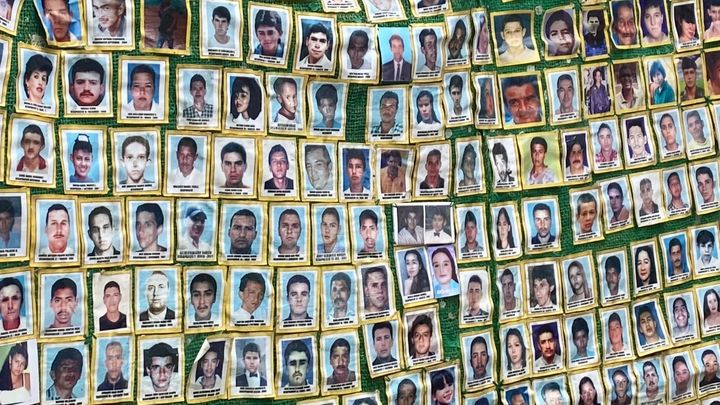
help Madres de la Candelaria pay rent
Teresita Gaviria Urrego is the president of Asociación Caminos de Esperanza (Path of Hope Association) Madres de la Candelaria. Her son Cristian Camilo was 15 when he disappeared in 1998; now, Teresita has only her memory of bidding him farewell the morning he left for Bogotá. Colombia’s capital is within a day’s distance by car from their home in Medellín, and making the trip seemed like a small risk at the time. But her son never arrived at his destination. Teresita spent several weeks searching for her son. With his photo in hand, she sought assistance from various federal agencies. For missing work in that time, she was fired from her position at Atanasio Girardot stadium.
More than a decade ago, Teresita discovered that her son’s disappearance was a result of forced recruitment gone wrong. An ex-paramilitary combatant told her that they were following orders from a commander when they dumped his body in the Magdalena River. She has traveled to the river both alone and with security guards, looking for Cristian and others along its shoreline. The missing include victims, recruits, and members of all sides of Colombia’s multifaceted war, including right-wing paramilitaries, left-wing rebels, state military entities and criminal organizations. All have madres who love, miss, and seek them.
Cristian remains missing. A year after his disappearance, Teresita founded the Madres de la Candelaria using Argentina’s Madres de la Plaza de Mayo (Mothers of May Square) as inspiration. The organization now has more than 800 members in the Antioquia department, the territory having the highest number of disappearances in Colombia, according to figures from the National Centre for Historic Memory’s (CNMH, for its Spanish acronym) Memory and Conflict Observatory.
Thus far, las Madres de la Candelaria have helped recover 111 disappeared persons including victims of every side of the multifaceted conflict. They observe hearings with former armed actors for any information that could provide closure to other families. They accompany investigators at burial sites. Teresita continues to lead search groups, with gloves and trowels, through the Magdalena Medio region of East Antioquia where mass graves have been found. Progress is slow; local officials have limited capacity but face a high number of investigations, including finding and identifying the bodies of the missing. Finding disappeared family members and helping all the women and men who have been victims of the violence is their main purpose.
To pay for their office, Teresita uses all but 200.000 Colombian pesos (about US$42) of her monthly income. To fund their work and as a form of art therapy, the Madres make crafts with donated supplies: faceless dolls with long arms for hugging, hand-embroidered bags bursting with color, intricate beaded jewelry (hello, hummingbirds!). They have one social worker, a full-time volunteer who does all she can with what she has but sorely needs support.
I am a professor of human rights and political science at the University of North Texas. This semester (Spring 2023), I am teaching a course in Advocacy and Activism. One of our goals, as a class and beyond the semester, is to raise enough money to pay Las Madres’ rent for a year. The cost is 1300.000 Colombian pesos (about US$280) per month, or 15600.000 COP (about US$3360) per year. This will allow them to look past subsistence and focus on doing the work.
“We want them … free and at peace: we will resist, search and persist until we find the truth.” Teresita and her son live in the memory of the resistance. Thank you for helping us to help them.
Organizer
Jacqueline DeMeritt
Organizer
Denton, TX